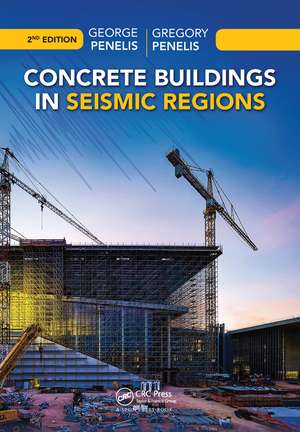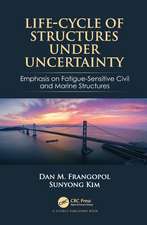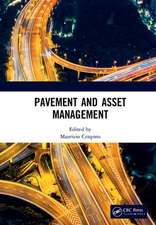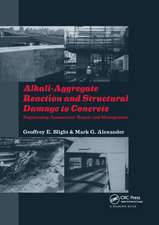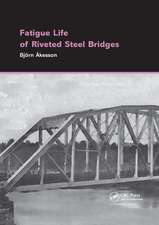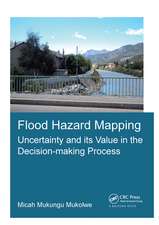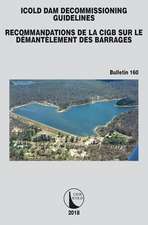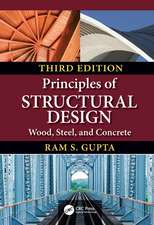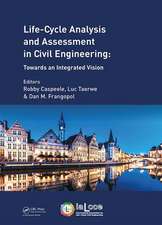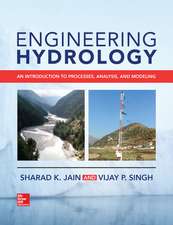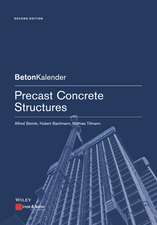Concrete Buildings in Seismic Regions
Autor George Penelis, Gregory Penelisen Limba Engleză Paperback – 30 iun 2021
Concrete Buildings in Seismic Regions comprehensively covers of all the analysis and design issues related to the design of reinforced concrete buildings under seismic action. It is suitable as a reference to the structural engineer dealing with specific problems during the design process and also for undergraduate and graduate structural, concrete and earthquake engineering courses.
This revised edition provides new and significantly developed coverage of seismic isolation and passive devices, and coverage of recent code modifications as well as notes on future developments of standards. It retains an overview of structural dynamics, the analysis and design of new R/C buildings in seismic regions, post-earthquake damage evaluation, pre-earthquake assessment of buildings and retrofitting procedures, and several numerical examples.
The book outlines appropriate structural systems for many types of buildings, explores recent developments, and covers the last two decades of analysis, design, and earthquake engineering. It specifically addresses seismic demand issues and the basic issues of structural dynamics, considers the "capacity" of structural systems to withstand seismic effects in terms of strength and deformation, and highlights the assessment of existing R/C buildings under seismic action. All of the material has been developed to fit a modern seismic code and offers in-depth knowledge of the background upon which the code rules are based. It complies with European Codes of Practice for R/C buildings in seismic regions, and includes references to current American Standards for seismic design.
| Toate formatele și edițiile | Preț | Express |
|---|---|---|
| Paperback (2) | 370.25 lei 6-8 săpt. | |
| CRC Press – 16 mai 2017 | 370.25 lei 6-8 săpt. | |
| CRC Press – 30 iun 2021 | 481.41 lei 6-8 săpt. |
Preț: 481.41 lei
Nou
Puncte Express: 722
Preț estimativ în valută:
92.16€ • 96.16$ • 77.26£
92.16€ • 96.16$ • 77.26£
Carte tipărită la comandă
Livrare economică 13-27 martie
Preluare comenzi: 021 569.72.76
Specificații
ISBN-13: 9781032094670
ISBN-10: 1032094672
Pagini: 820
Ilustrații: 542 Illustrations, black and white
Dimensiuni: 178 x 254 x 45 mm
Greutate: 1.52 kg
Ediția:Nouă
Editura: CRC Press
Colecția CRC Press
ISBN-10: 1032094672
Pagini: 820
Ilustrații: 542 Illustrations, black and white
Dimensiuni: 178 x 254 x 45 mm
Greutate: 1.52 kg
Ediția:Nouă
Editura: CRC Press
Colecția CRC Press
Public țintă
Postgraduate and ProfessionalNotă biografică
George G. Penelis is Emeritus Professor at the Aristotle University of Thessaloniki, Greece, has served as national representative on the drafting committee for Eurocode 2, is ordinary member of Academia Pontaniana, Italy, and has published more than 250 technical papers, and is co-author of Earthquake Resistant Concrete Structures.
Gregory G. Penelis is the CEO of Penelis Consulting Engineers S.A., and has been involved in the design/review of more than 100 buildings throughout Europe. He has been involved in many research projects regarding the seismic assessment of listed and monumental buildings.
Gregory G. Penelis is the CEO of Penelis Consulting Engineers S.A., and has been involved in the design/review of more than 100 buildings throughout Europe. He has been involved in many research projects regarding the seismic assessment of listed and monumental buildings.
Cuprins
Preface to the second edition, Preface to the first edition, List of abbreviations, Authors, 1. Introduction, 2. An overview of structural dynamics, 3. Design principles, seismic actions, performance requirements, compliance criteria, 4. Configuration of earthquake-resistant R/C structural systems: structural behavior, 5. Analysis of the structural system, 6. Capacity design – design action effects – safety verifications, 7. Reinforced concrete materials under seismic actions, 8. Seismic-resistant R/C frames9. Seismic-resistant R/C walls and diaphragms, 10. Seismic design of foundations, 11. Seismic pathology, 12. Emergency post-earthquake damage inspection, assessment and human life protection measures, 13. Seismic assessment and retrofitting of R/C buildings, 14. Technology of repair and strengthening, 15. Seismic isolation and energy dissipation systems, References, Index
Descriere
This connects basic earthquake engineering principles with practical structural design. It includes recent developments of RC structures and nonlinear analysis, structural intervention prior or post-earthquake, and now introduces seismic isolation and passive devices. Complies with European Codes for the seismic design of RC buildings.
Recenzii
"This book is arguably the most comprehensive and accessible book on the subject. It pulls together the wide range of tools and procedures for a complete treatment of structural earthquake engineering, from building components, to regional impact assessment, including foundations. The book will be invaluable for practicing engineers, students, researchers, and emergency managers."
—Amr S. Elnashai, FREng, Head of Civil and Environmental Engineering Department, University of Illinois at Urbana-Champaign
"This is a comprehensive and excellent book covering all aspects of seismic design and seismic assessment including post-earthquake retrofitting and repair. The latest analysis and design concepts are explained with a focus on RC structures, and it is highly recommended."
—Jean-Pierre Rammant, Nemetschek Scia nv
"I do not believe that you could find a more extended and well organized text that addresses the state of the practice of seismic design of concrete buildings."
––Michele Calvi, President, European Centre for Training and Research in Earthquake Engineering
—Amr S. Elnashai, FREng, Head of Civil and Environmental Engineering Department, University of Illinois at Urbana-Champaign
"This is a comprehensive and excellent book covering all aspects of seismic design and seismic assessment including post-earthquake retrofitting and repair. The latest analysis and design concepts are explained with a focus on RC structures, and it is highly recommended."
—Jean-Pierre Rammant, Nemetschek Scia nv
"I do not believe that you could find a more extended and well organized text that addresses the state of the practice of seismic design of concrete buildings."
––Michele Calvi, President, European Centre for Training and Research in Earthquake Engineering
